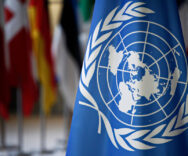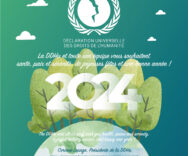
The Universal Declaration of Human Rights was presented at the Rencontres Economiques d’Aix-en-Provence on July 8, with the main theme: Taking our future in hand. It was presented more specifically in session 27: “What governance in a world shaken by climate change? This session addresses the refusal of the Paris Agreement by the United States and questions the “governance of climate change induced problems” to be adopted.
Within the framework of this event, the following written contribution was communicated.
08/07/2018
Author : Corinne Lepage
A TRIPLE OBSERVATION
Climate disruption is on the way to turning the world upside down: the succession of extreme weather events with their human tragedies and astronomical costsAccording to the Oceanic and Atmospheric Agency, this means 306 billion dollars and according to the reinsurer Munich Re 330 billion dollars for the year 2017, that is to say a record of more than double the cost of the year 2016, that is to say 1720 dollars per second, the rise of the phenomenon of migration with its political consequences, the increasing difficulties of feeding. But the world continues to increase its greenhouse gas emissions, despite increasingly alarming reports from climate and biodiversity scientists.
The observation is that global climate governance is relatively powerless
Current governance is powerless to respect and enforce the commitments made in the Paris AgreementThe two processes that should be concluded in 2018 are: the affirmation of the Rulebook on North-South cooperation mechanisms and the Talanoa dialogue to make a first blank assessment of the contributions of States under the Paris Agreement.
- First of all, the States that have been reluctant to define their INDCs (Intended Nationally Determined Contributions), and especially at a level compatible with the Third Assessment and, on the contrary, with the climate emergency, are showing themselves to be just as reluctant to reduce their emissions since the emission reduction targets have been set.Global CO2 emissions should be limited to 42 Giga tons by 2030This is almost 12 Gt more than currently forecast. Estimated at 41 Gt for the year 2017, CO2 emissions are expected to reach 54 to 56 Gt by 2030, if nothing is done to change things. At the same time, the commitments made to Africa, particularly with regard to financing, i.e. a minimum of 100 billion per year from 2020, have not been met and the withdrawal of the United States from the Paris Agreement is very bad news in this respect.
- Secondly, the effects of climate change and the accelerated desertification that a suicidal policy of deforestation has reinforced would justify an increased effort on adaptation policies. Thus, a vicious circle is set up, as the failure to meet mitigation objectives increases the need for adaptation policies.
- Thirdly, and in contrast, the mobilization of civil society is increasing thanks to multilateral cooperation on climate, through international cooperative initiatives (ICI) on climate which can, depending on the case, link public and/or private actors, and take any form. In this context, the solutions agenda that brings together all these initiatives has led academics to speak of a groundswell of climate action. In addition to these multiple cooperation frameworks, there is a dynamic between technical experts, institutions linked to the United Nations Framework Convention on Climate Change (UNFCCC), and the connection with the sustainable development objectives, thus making it possible to respond to Article 6 of the Paris Agreement which establishes a link between climate and sustainable development. Finally, the use of “Name and Shame” as well as “Name and Fame” will play an increasing role for all state and non-state actors.
This observation leads to the recognition that a profound transformation in governance is taking place
- First of all, we are witnessing a reversal of the pressure in favor of the fight against climate change, which is increasingly moving from civil society to the States and not the other way around, even if the States keep talking about mobilizing their population. The position taken by U.S. President Donald Trump, and the boomerang effect it has had on some states, starting with California, on major cities on both the East and West coasts of the United States, and on very large corporations, is a perfect illustration. The global awareness of citizens, which is perfectly reflected in the consensus conference organized in 2015 by the French National Commission for Public Debate, also attests to this. It is now the first victims of climate change but also the economic interests that rely on the transition and become the drivers of the transformation.
- The real changes are made through new mechanisms that result from the global climate action agenda through international cooperation initiatives. The actions identified in the area of non-state actors for climate action are in particular cities and regions. Similarly, carbon finance and more generally the evolution of financial institutions is considerable. The improvement of transparency systems both in the reality of greenhouse gas emissions thanks to the implementation of new technologies and in the control of the effectiveness of the actions implemented is essential in this respect.
- Finally, the law is being transformed in two ways. On the one hand, with the emergence of texts and in particular the Universal Declaration of Human Rights (DDHu) signed and supported by public entities and in particular large cities as well as private entities (NGOs, companies) and institutions (universities, many bars in the world), and personalities starting with Mr. Ban Ki-moon. On the other hand, with the rapid development of the climate justice, which creates a coalition between judges and civil society to compel states to act and to seek out those most responsible for greenhouse gas emissions in order to make them contribute to the damage they have caused, notably on the basis of the Heede report.
Thus, while all the signals are red, this climate issue that concerns humanity as well as other species is perhaps a tremendous sign of hope that reason and the instinct for conservation will prevail, establishing a global and local governance capable of responding to the challenges of the Anthropocene.
Watch the video of session 27 (“What governance in a world shaken by climate change?”) below:




